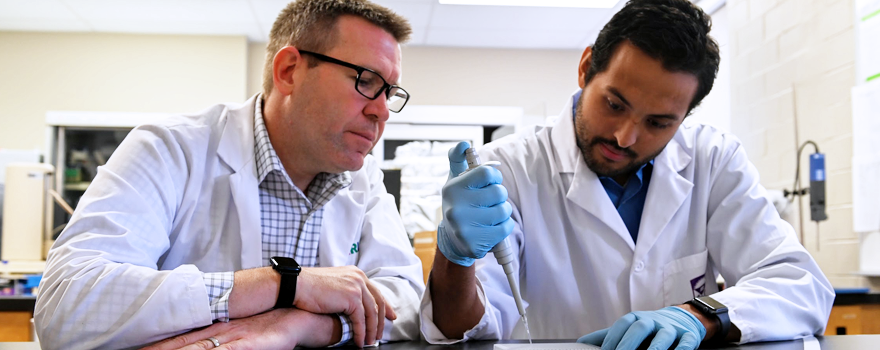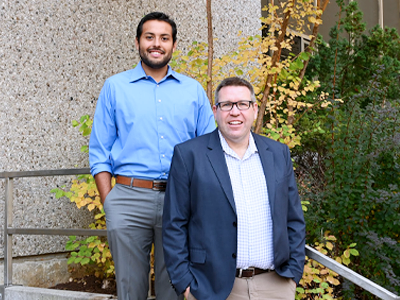Research shows prenatal exposure to cannabis may increase diabetes risk in offspring
 A study led by PhD candidate Sebastian R. Vanin (right), under the supervision of Daniel B. Hardy, PhD, has shown that even moderate exposure to CBD during pregnancy is linked to post-birth glucose intolerance specifically in males. (Prabhjot Sohal/Schulich Medicine & Dentistry)
A study led by PhD candidate Sebastian R. Vanin (right), under the supervision of Daniel B. Hardy, PhD, has shown that even moderate exposure to CBD during pregnancy is linked to post-birth glucose intolerance specifically in males. (Prabhjot Sohal/Schulich Medicine & Dentistry)
By Prabhjot Sohal
Cannabis consumption is prevalent among pregnant women in North America, particularly those between the ages of 18 and 24 years, previous research has shown. They report using it for various reasons, including alleviating nausea, body aches and anxiety related to pregnancy.
While existing clinical data points to negative effects like fetal growth restriction and abnormal blood sugar levels in children born to mothers who used cannabis, the impact of the non-psychoactive compound of cannabis, cannabidiol (commonly known as CBD), on metabolic outcomes of the offspring remains less understood.
A new study in animal models, led by PhD candidate Sebastian R. Vanin, under the supervision of Daniel B. Hardy, PhD, has shown that even moderate exposure to CBD during pregnancy is linked to post-birth glucose intolerance specifically in male offspring.
“This is a critical finding, given that CBD, unlike cannabis’ psychoactive compound, tetrahydrocannabinol or THC, is widely marketed and perceived to be a safer option by so many,” said Hardy, associate professor in the Departments of Obstetrics & Gynaecology and Physiology & Pharmacology.
While it is THC that leads to the “high” effect cannabis users experience, CBD is the primary non-psychoactive compound in cannabis, and is also medicinally used for the treatment of certain forms of epilepsy, schizophrenia and depression.
“Our study shows that exposure to CBD alone during pregnancy can be detrimental to the metabolic health of the offspring later in life, leading to glucose intolerance. This is a major risk factor for diabetes,” said Hardy, who is also a scientist in the division of maternal, fetal and newborn health at Children’s Health Research Institute.
The study, published in the Journal of Endocrinology, shows that while CBD exposure did not lead to adverse maternal or neonatal outcomes in the rodent model, by three months of age male offspring exposed to CBD during gestation exhibited glucose intolerance.
A previous study from the Hardy Lab showed that prenatal exposure to THC, the main psychoactive component of cannabis, in rat model led to glucose intolerance and insulin resistance in female offspring.
 Vanin (left) and Hardy are studying how cannabis exposure during pregnancy influences the development of other metabolic organs including the pancreas, liver and heart. (Prabhjot Sohal/Schulich Medicine & Dentistry)
Vanin (left) and Hardy are studying how cannabis exposure during pregnancy influences the development of other metabolic organs including the pancreas, liver and heart. (Prabhjot Sohal/Schulich Medicine & Dentistry)
“With the latest study, we now know that gestational exposure to either cannabinoid – THC and CBD – can lead to glucose intolerance in the offspring. However, THC exposure impacts the glucose tolerance of female offspring while CBD exposure impacts the male offspring,” said Vanin.
The male offspring that were exposed to CBD exhibited changes in their genes that control body clocks, particularly the circadian rhythm clock. This can adversely impact how our bodies regulate sugar or glucose. Males also exhibited changes in how their livers develop and function, which suggests that being exposed to CBD while in the womb could harm liver development and health throughout the course of life.
“After legalization of cannabis in Canada and the subsequent increase in its use, there’s a lot of focus on how cannabis impacts the brain, especially the developing brain. We are also interested in studying how cannabis exposure during pregnancy influences the development of other metabolic organs including the pancreas, liver and heart,” said Hardy.
The Hardy Lab focuses on studying how impaired fetal development can predispose offspring to metabolic deficits in adulthood.
“Pre-natal exposure to cannabis can also occur through fathers, so we are currently interested in studying how that impacts fetal growth and development as well.”
Hardy’s team is also collaborating with other researchers at Western to develop new models to study the impact of cannabis consumed in the form of edibles, smoke and vapour.
The team also included Western researchers Kendrick Lee, Mina Nashed, Brennan Tse, Mohammed Sarikahya, Sukham Brar, Gregg Tomy, Amica-Marie Lucas, Thane Tomy, Steven Laviolette and Edith Arany.








